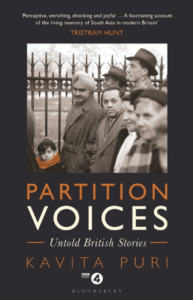 Jasmin Kaur Athwal (Joint Honours Ancient History & Archaeology and History) undergraduate offers us five ways to get involved in the inaugural South Asia Heritage Month (SAHM) from the comfort of our own homes and tells us in their blog about forthcoming events, recommended reading and how to volunteer and get directly involved with SAHM.
Jasmin Kaur Athwal (Joint Honours Ancient History & Archaeology and History) undergraduate offers us five ways to get involved in the inaugural South Asia Heritage Month (SAHM) from the comfort of our own homes and tells us in their blog about forthcoming events, recommended reading and how to volunteer and get directly involved with SAHM.
Since the mid-20th century South Asians in Britain (a strong community of 3 million) have created their distinctive identity and rightful place in Britain. Despite their strong presence in Britain, we do not know much about South Asian Heritage. Even as a third-year history student, last year was the first time I ever came across it properly in academia. Thus, for the first time, South Asian Heritage Month (SAHM) has been launched to celebrate and raise the profile of British-South Asian history in the UK. So, in this global pandemic and with lockdown restrictions, this initiative will be launched online (from 18 July to 17 August). However, these restrictions have enabled a distinctive approach, allowing many to connect virtually via innovative means.
Here, I offer five ways for you to get involved with the South Asian Heritage Month in the comfort of your home.
- SAHM Online event highlights
Organised thematically, SAHM is catering for everyone. From food and fashion, to mental health and wellbeing – the events are diverse and all encompassing, highlighting the diversity of the British South Asian experience. Here are a couple of events that I am looking forward to:
- “Of Warrior Queens, Moon-faced Singers & Dancing Girls: Gender at the Lahore Darbar” Priya Atwal in conversation with Radha Kapuria (22 July 17.00-18.00) where they will talk about the impressive women behind the scenes in the 19th century Sikh Empire.
- “Masala Monologues”, Sangeeta Pillai (23 July 18.00-20.00) talks about her project upon taboo subjects from South Asian women across a variety of backgrounds.
- “Poetry through the Eyes of South Asian Communities” (6 August 17.00-18.00) is a workshop led by a South Asian poet using objects from Manor and Museum to re-interpret them with South Asian Heritage.
- “Being a South Asian Mother in the Diaspora” discussion with Jane Chelliah, (7 August, 17.00). This conversation will highlight the experience of an important (but often silenced) group in the South Asian community.
- Read
Lockdown has created a surge in reading, allowing us to explore and venture out while being restricted. So, I have created a short reading list of books which I think will allow you to better understand the diversity of South Asians, as well as the interconnected nature of Britain and South Asia.

- Partition Voices by Kavita Puri. In this book, Puri captures the Partition stories of those who relocated to Britain after being displaced by Partition. Their stories evoke strong emotion and reminding us of their personal hardships which both them and their families faced when migrating and starting over twice. This is a must for those reading about Partition and the South Asian Diaspora!
- Midnight’s Children by Salman Rushdie. Magically written, this book traces the life of Saleem Sinai who was born on the strike of midnight, alongside his country India. This coincidence defines his life as his experiences run parallel with those of his twin, India. This fiction highlights the postcolonial struggles of India with historical events. This book is a must for those trying to understand the diversity of India, as well as the problematic postcolonial definition of India.
- A Postcolonial People by Nasreen Ali, Virinder Kalra and Salman Sayyid (eds). This edited volume focuses upon the politics, history and the everyday experiences of the South Asian diaspora in postcolonial Britain. This academic approach does a great job showcasing the diverse experience of those migrating to Britain, from schooling to contemporary representations in media.
- City of Djinns: A Year in Delhi by William Dalrymple. This has been one of my favourites reads during lockdown as it beautifully transported me to Delhi. As the title suggests, Djinns (ghosts, which is a simple translation!) of Delhi haunt the city in the modern day, from buildings old as time to the stories and conversations today. Accompanying his journey of Delhi, we share his curiosity and awe of modern Delhi which has been morphed into a diverse city through the experiences of its history.
3. UKPHA Book Club
 During lockdown, UKPHA (United Kingdom Punjab Heritage Association) have started a virtual book club, bringing together authors, academics, journalists and broadcasters to present topics related to Sikh and Punjabi heritage. This is an important venture educating the growing audience on important topics which define who Sikhs and Punjabis are today in Britain. My favourites so far have been Davinder Toor’s talk on his renowned collection (which literally brings the Sikh Empire to life), Jvala Singh’s talk on Punjabi Proverbs (which is the topic of his book, brought back so many nostalgic conversations) and Aanchal Malhotra’s conversation with Kavita Puri on her book Remnants of Partition (her fresh approach to Partition by using material culture showcases the diverse nature of disruption caused by Partition). Following these great talks and conversations, they’ve got a fantastic line up (I’m really looking forward to Meera Syal’s conversation (who is part of this month’s talk), William Dalrymple’s talk on his new book Anarchy and Shashi Tharoor later on in October!).
During lockdown, UKPHA (United Kingdom Punjab Heritage Association) have started a virtual book club, bringing together authors, academics, journalists and broadcasters to present topics related to Sikh and Punjabi heritage. This is an important venture educating the growing audience on important topics which define who Sikhs and Punjabis are today in Britain. My favourites so far have been Davinder Toor’s talk on his renowned collection (which literally brings the Sikh Empire to life), Jvala Singh’s talk on Punjabi Proverbs (which is the topic of his book, brought back so many nostalgic conversations) and Aanchal Malhotra’s conversation with Kavita Puri on her book Remnants of Partition (her fresh approach to Partition by using material culture showcases the diverse nature of disruption caused by Partition). Following these great talks and conversations, they’ve got a fantastic line up (I’m really looking forward to Meera Syal’s conversation (who is part of this month’s talk), William Dalrymple’s talk on his new book Anarchy and Shashi Tharoor later on in October!).
- Volunteer with SAHM
Another way to get directly involved in this year’s SAHM is through volunteering. SAHM would like to reflect British South Asian identity with the help of volunteers. You can help by organising and hosting a digital event and share the information about this initiative further by using #SouthAsianHeritageMonth on your social media. Furthermore, Manchester Museum and the British Council have proposed a youth-led programme and are offering paid opportunities for young people (between the ages of 18-25) willing to run SAHM activities or events.
- Conversations!
A good and easy way to get involved is through conversations. Everyone has their unique experience and connections to South Asia. These conversations can help bring stories forward and allow them to be remembered, otherwise we might end up losing them in history itself. So, for this South Asian Heritage Month converse with people who have connections to South Asia. Whether it’s a family member, friend or neighbour, ask about their experience as a South Asian in Britain. You might uncover some stories which are sometimes too hard to talk about or there has never been a chance for it to be mentioned.
Important links:
- SAHM website: https://www.mminquarantine.com/south-asian-heritage-month
- UKPHA Book club registration: http://www.ukpha.org/bookclub
- Volunteering opportunities with SAHM: https://www.mminquarantine.com/sahm-call
